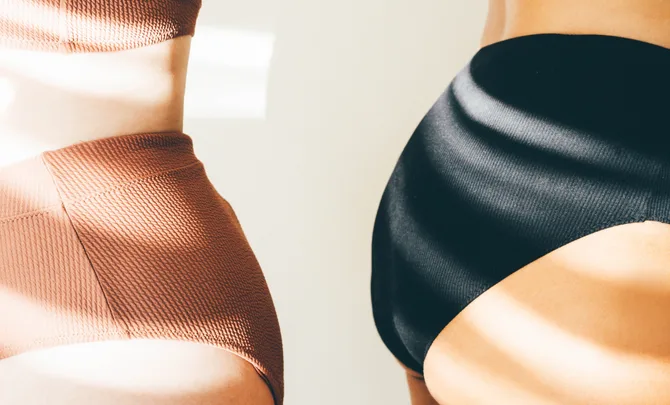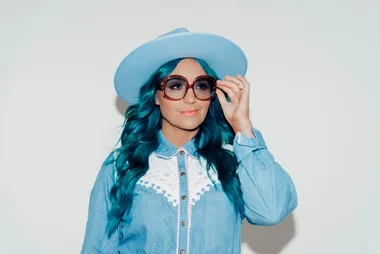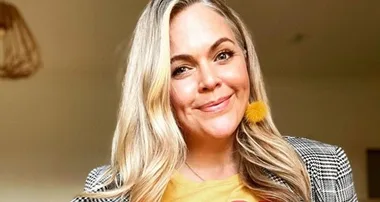The body image space has come a long way since the days of ‘nothing tastes as good as skinny feels.’ It’s been 15 years since Kate Moss first shared that mantra – and a lot of work has been done between then and now. From the swell of body positivity in the 2010s, we’re shifting towards a state of body neutrality: where we accept and respect our bodies as the physical vessels they are, without focusing on the way they look.
At its core, the concept of body neutrality is existing in our skin without thinking negatively or positively about the exterior. It’s being at peace as is.
The tide may have turned, but the body neutrality movement is still rising. We’re not there yet. We still follow personal trainers on Instagram for the #aesthetics, watch “plus-size” models do realistic try-on hauls on TikTok, and listen to addresses from body image leaders. We spend a lot of time – and money – on the way our bodies look. It’s big business.
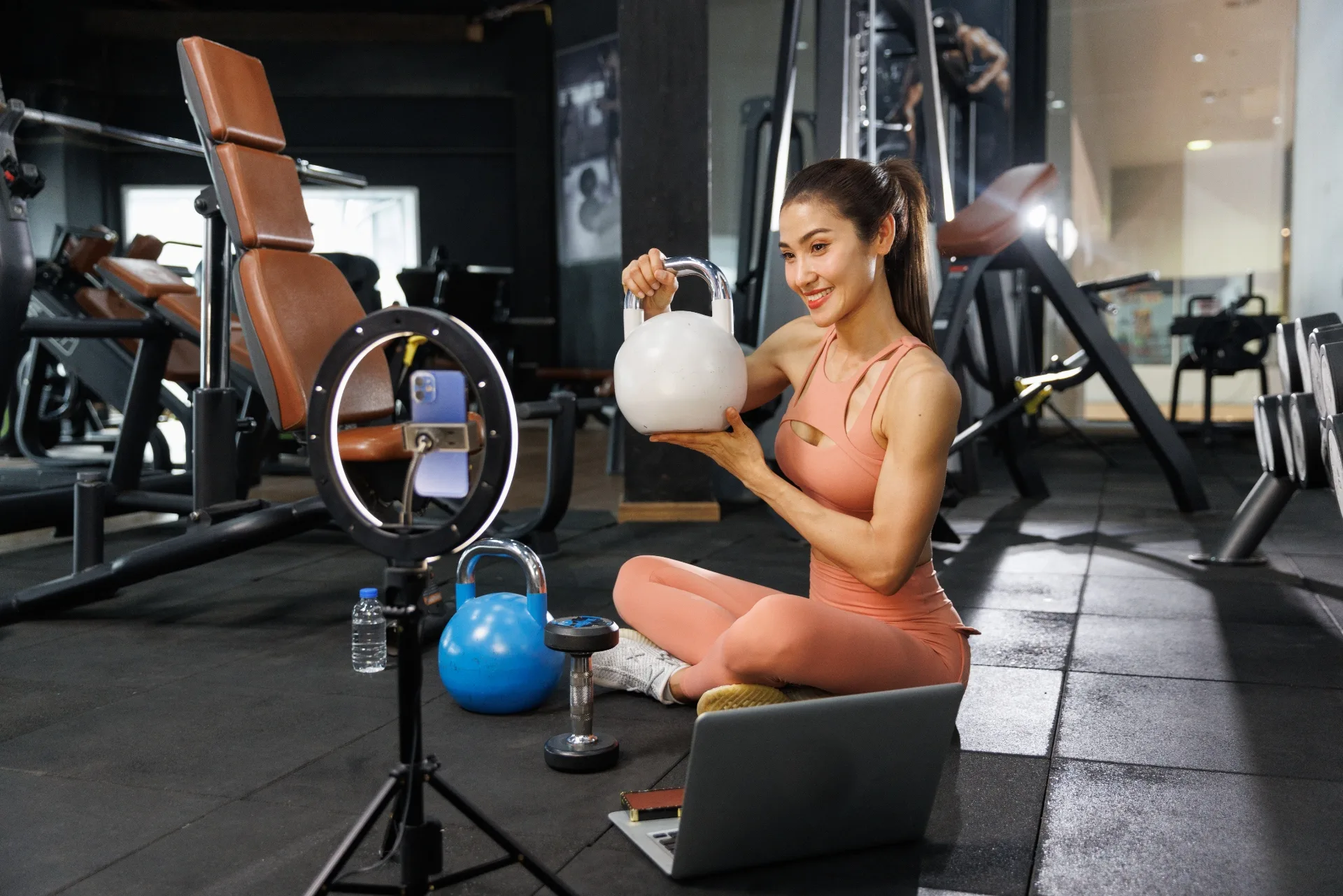
For those in the industry – the ones we follow, watch and listen to – their bodies are their brands. They’ve built communities and businesses by talking openly about their bodies, and sharing their habits and mindsets around their bodies. They earn an income from people, partnerships and brands who are inadvertently invested in their bodies. Their livelihoods are linked to the way they look.
It’s a complicated space to exist in. When your work puts your body out there for public consumption, it’s almost impossible not to think about said body. Even when you’re promoting strength over slimness or championing self-acceptance, you can’t make everyone happy. In the public eye, there’s always going to be someone criticising the work you do, and – by default – the body you exist in.
Here, we ask three women how they navigate the business world when their body is their brand.
On Dismantling Diet Culture And Healing From Distorted Body Image
As one of the first trainers on Kayla Itsines Sweat App, Kelsey Wells is a fitness mogul with three million followers on Instagram. After discovering the power of exercise while struggling with post-partum anxiety following the birth of her son nine years ago, Wells has built a following – and a business – by “redefining fitness.” Her journey to having a healthy relationship with her body hasn’t been linear, though, and it is still ongoing.
“I was looking at a photo of myself from a shoot I did a few years ago, and it jarred me. I was so shredded [in the image], and at my very lowest body fat percentage. It was extreme, maybe even borderline unhealthy. Looking at the photo, memories from the shoot day came flooding back to me.
I remember waking up and feeling bloated and self-conscious. I wasn’t sure if I was lean enough to be doing the shoot. Remembering how I felt – and how I saw myself – on that day really shook me. It was at that point when I realised I was having distorted body image issues. Again.
When I was young, I was very self-conscious and self-critical. In eighth grade, I was bullied for being flat chested and that’s been seared into my mind. As I entered young adulthood, I had a pretty unhealthy relationship with myself and my self-image. At the time I didn’t realise how unhealthy it was.
I thought it was normal to always want to shrink yourself; to punish yourself if you ate too much; to look at a photo and tear yourself apart. I had absorbed beliefs through diet culture and adopted that as my own inner dialogue.
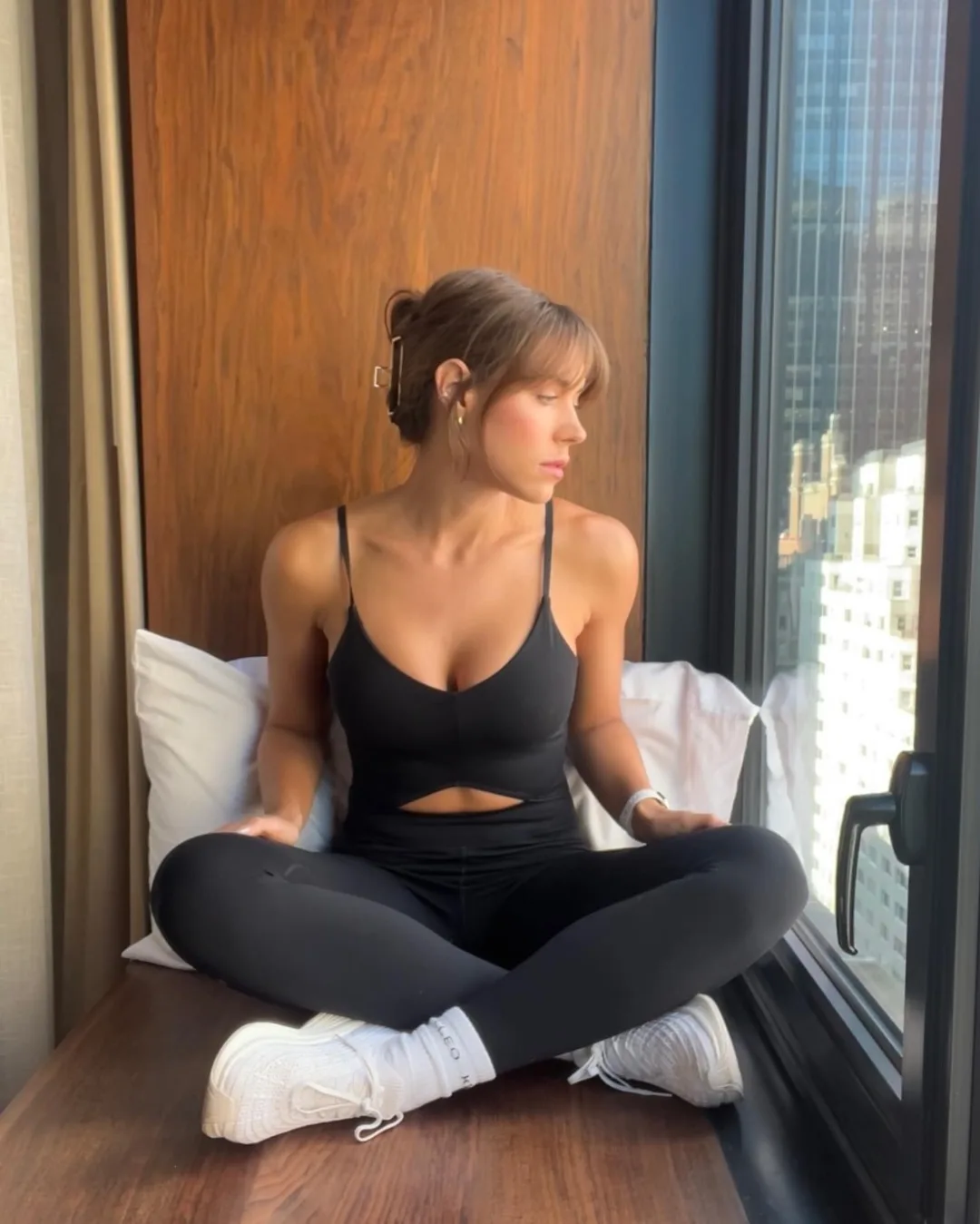
Over the years, I have experienced distorted body image. My self-critical thoughts were at an all-time high after I had my son. I remember looking in the mirror post-partum and not recognising my physical body. It was so dark and difficult. I hit rock bottom. I was experiencing regular panic attacks, and at a postpartum appointment, the doctor suggested exercise could help with my mental wellbeing. So, I started exercising, and it was the first time in my adult life that I put effort into my body from a place of healing, rather than hatred. It was a huge epiphany, and that’s how everything began for me.
In the last nine years, my relationship with my body has completely changed. The negative, hateful thoughts are now the exception instead of the rule. That doesn’t mean they’re not there, though. It would be easy to say I’ve healed – and I have – but healing is never linear. Self-love isn’t a destination, it’s a state of being.
During certain times, I have struggled with being in the spotlight on a global scale. My job is to help people understand that the primary reason for movement shouldn’t be physical aesthetics. But there is a fear that unless I look a certain way physically, no one will listen to what I have to say. I’ve held myself to a higher standard of training and nutrition and I have been extremely disciplined [because of that]. The way I was living probably wasn’t sustainable or healthy, but [I thought] I was the exception because it was my career, and the eyes of the world were judging me. Having my body be so tied to my career made me super focused on how I looked.
When I realised that, I used a lot of different tools – including mindfulness – to help myself take a step back and detach. Now, I think about myself a hell of a lot less. I know people might follow me because of how I look, but that’s no longer my concern. And it’s definitely not something I’m going to kill myself over.”
On Moving Beyond #BodyLove, And Towards Self-Acceptance
In 2013, Taryn Brumfitt flipped the script on “before and after” photos when she posted two photos of herself on Instagram, side by side. The before was an image of her at her fittest, competing in a body-building event, expertly posed in a sparkly silver bikini and a deep tan. The after was her comfortable in her own skin, au natural and relaxed. The post went viral and off the back of the media storm, Taryn started the Body Image Movement, an international mission to help people embrace their bodies. Then came the documentary, ‘Embrace,’ in 2016, the book ‘Embrace Yourself’ in 2018, an Australin of the Year award in 2023, and the new film ‘Embrace Kids.’
“I had three babies in three-and-a-half years, and my body didn’t bounce back. There was a huge societal expectation to lose the baby weight, and I got caught up in that narrative. I didn’t like what my body looked like and I wanted to change it, so I booked in to have a breast augmentation and a tummy tuck. I was focused on having the perfect body.
I was playing with my daughter Mikayla when I decided I couldn’t go ahead with the surgery because of the message it would send to her. It’s important for me to say that just because I didn’t have surgery, doesn’t mean anyone else who has is a bad role model. Your body, your choice. My body, my choice.
Even though I didn’t go ahead with the surgery, I was still plagued by the thought of having the perfect body. That’s how the bodybuilding competition came about, which led to me posting the non-traditional before and after. When that went viral, I was inundated with heartbreaking stories. I understood how much trauma and sadness people felt about their bodies. I asked myself, how can I help? That’s how the film and the book [and the Body Image Movement] came about. That was a decade ago. We’ve come a long way; today we understand that body image is a problem and it can have a profoundly negative impact on people’s physical health and mental wellbeing.
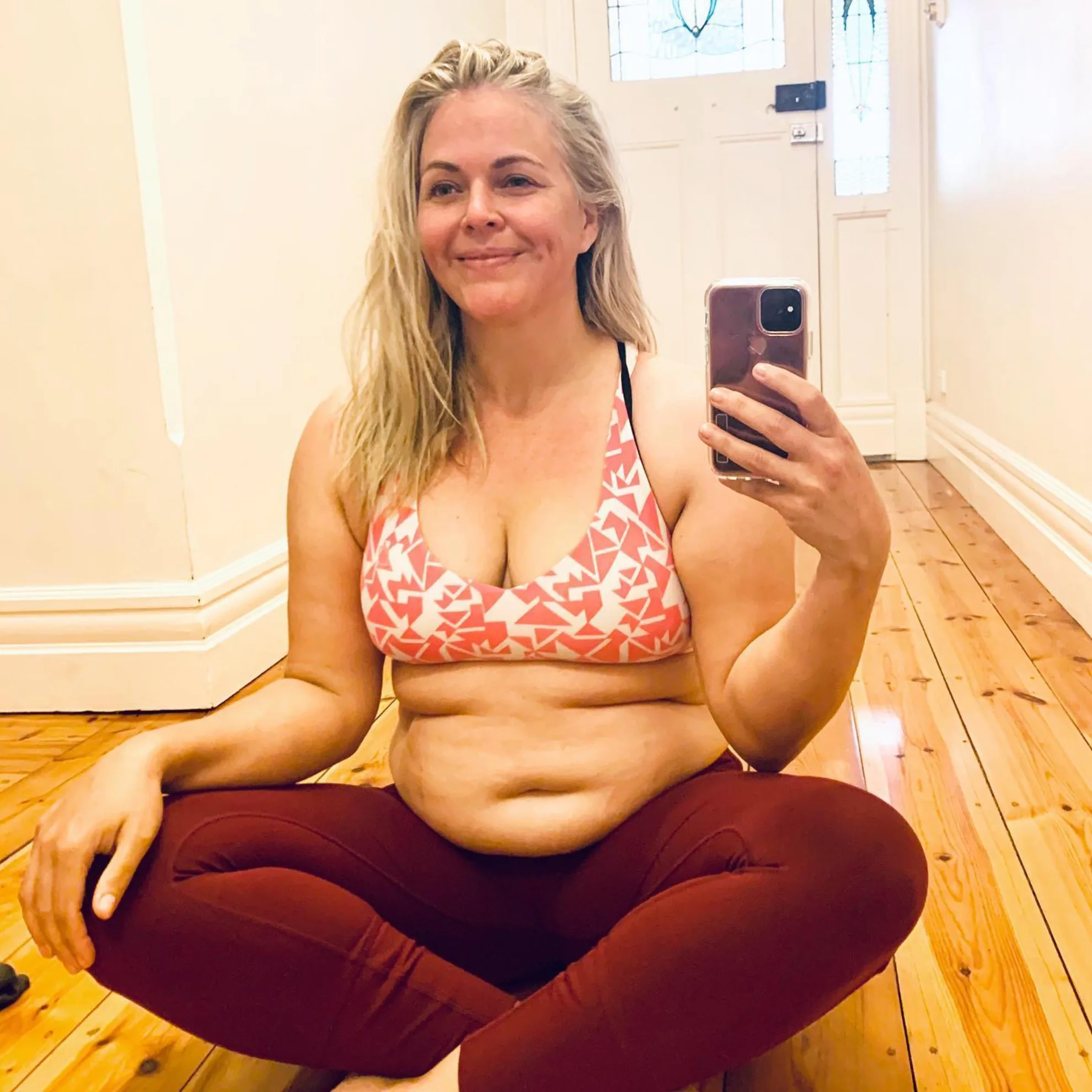
[As a leader in the body image space] I don’t feel any pressure [to look a certain way]. I don’t spend a lot of time focused on my appearance. My body is the least interesting thing about me, which is something I teach kids. That’s not to say you can’t care about your hair, or dressing up or wearing make up. It just means I put more focus on how I feel than how I look.
I remember people reacting to Celeste Barber (who is an executive producer of the ‘Embrace Kids’ documentary) losing weight and I was livid. I got asked about it three or four times in interviews. I was like, ‘We love Celeste because she makes us laugh. Whether she does that in a large body or a small body, who cares? It’s none of our business.’ Bodies change. There are ebbs and flows. For me, I think what I say and do is more important than what I look like or a number on the scale.
I spent decades not really liking my body. But since finding this profound love [for my body], I haven’t turned back. I don’t have bad body image days [anymore]. I think the only time in the last 10 years that I had to do a little recalibration was after my 19-year marriage ended and I started dating again. It was just a thought, ‘Oh my God, someone’s going to see me naked.’ I had the thought, and then I moved on. I decided I wasn’t going to be sidelined in the bedroom because of that thought.
Today, at 46, after a couple of marathons, a few kids and lots of adventures, I feel incredibly grateful for all that my body does for me. I have a deeper appreciation for it than ever before.
You don’t have to love your body, you can just like it or be okay with it. Body neutrality is just as powerful.”
On Confronting the “Body Positivity” Label
After being laid off from her music industry job at the onset of the pandemic, Remi Bader signed up for a little thing called TikTok. Fast forward through one viral “Realistic” try-on haul after the other, and the curve model became one of the most successful content creators on the platform, landing major deals with PINK as a size consultant and a capsule collection with Revolve. But Bader doesn’t want her honesty to be mistaken for expertise or her candidness to equate to unabridged self love.
“Everyone very quickly started calling me ‘body positive Remi.’ I didn’t care; I was excited. But over time, I realised I didn’t want to be put inside this body positive box. I don’t feel body positive at the moment and I never want to be inauthentic.
’ve had people come to me and say, ‘Well, you are body positive. It doesn’t mean you need to love your body every day.’ But when I think about body positive content creators, it’s really those people that always show off their body and are able to love their body no matter how it looks—whether they stick out their stomach or are in a certain position. For me, I feel confident when I put on a nice outfit or get my hair and makeup done. That doesn’t mean that I love every second of what’s going on underneath. It’s more of body neutrality. It’s accepting that this is me. I’m not going to hide in my room. I’m going to go live my life.
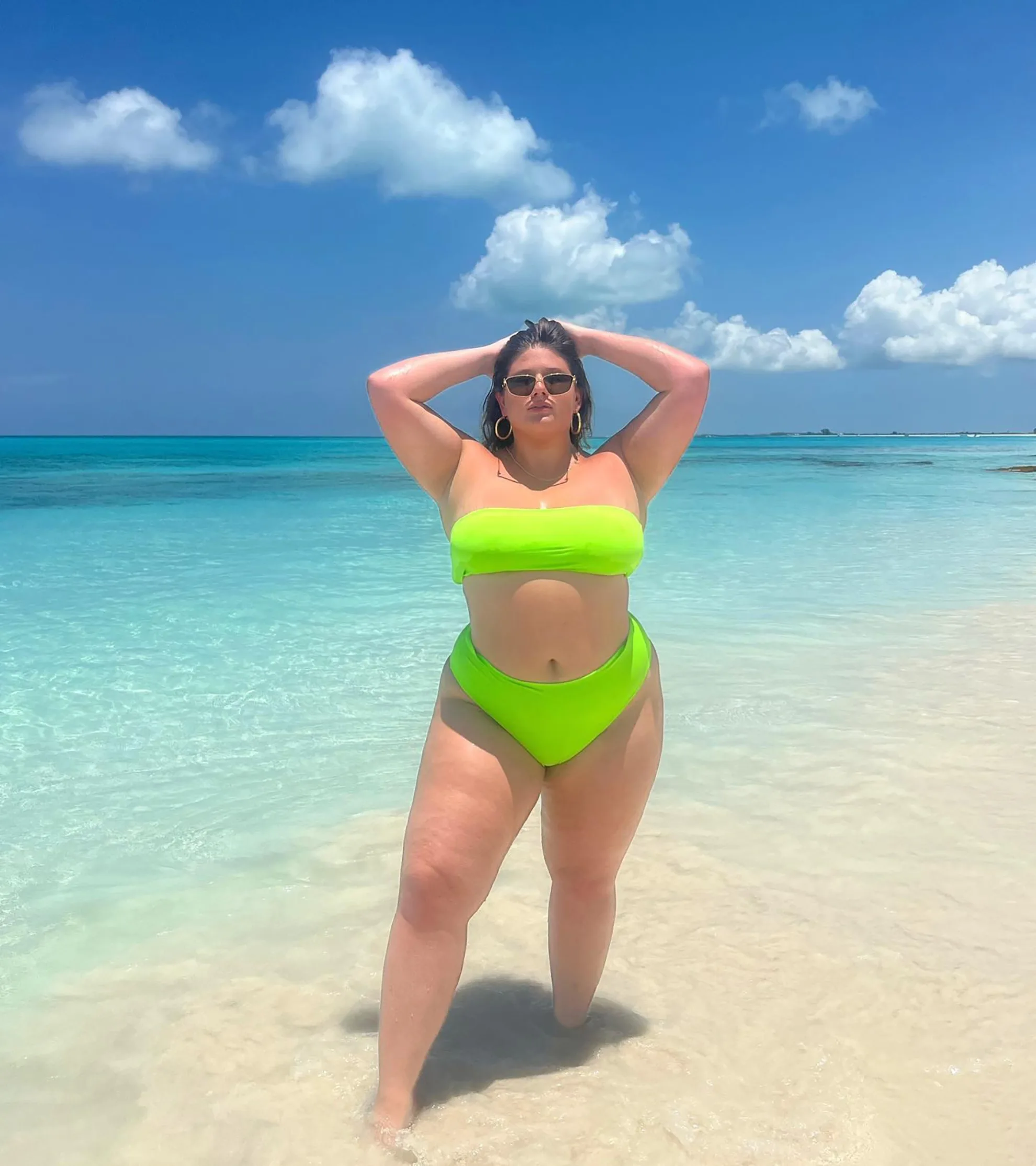
When I stopped going by ‘body positive Remi,’ it brought about some negativity. Some people would say, ‘Well, she says she’s not body positive so why are we looking up to her?’ That turned into people calling me fat phobic. Not feeling good in my body every single day isn’t body positive and it’s not fat phobic, it’s just me living life. People like to title things and I don’t think that’s necessary.
I started in this industry talking about my body, so I have to accept that my figure is always going to be tied to my brand. And I have to be okay with the positives and negatives that come with that. I just have to keep reminding myself that I am affecting people in a positive way. The fact that I’m working with Revolve and PINK, helping them with their sizing, and making clothes that are going to fit more bodies—there’s nothing better than that.
Of course, I’ve gotten negative feedback for not being the biggest size or not doing enough to help [the curvy or plus-size community], but I’d rather be the smallest, tiniest part of change in the fashion industry than doing nothing at all.
Most of my followers have been on my journey with me. They know my struggles and they’re happy if I’m happy. There’s always this lingering question: If you lost weight would it affect your brand. First of all, I’m never going to be a size zero. It’s not in the cards for me, but if I were to automatically lose 100 pounds, maybe I’d lose some followers. Maybe I’d gain some more? I try to not let that thought affect me. I’m just trying mentally to be a little more accepting of my current body.”
